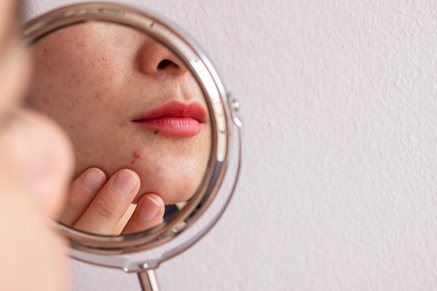Dr. Badia Featured in Dermatology Times Talking About the Rise of Adult Acne in Women
Sandra Fyfe
Dermatology Times, Dermatology Times, October 2022 (Vol. 43. No. 10), Volume 43, Issue 10
This article has been excerpted. Read the entire article.
Anais Aurora Badia, DO, an adult and pediatric dermatologist and founder of the Florida Skin Center, now part of Advanced Dermatology and Cosmetic Surgery in Fort Myers and Lehigh Acres, Florida, spoke with Dermatology Times® on the increasing rates of adult acne and how to treat it.
 Factors Contributing to Adult Acne
Factors Contributing to Adult Acne
Dr. Badia said that adult acne and adolescent acne share similar causes and that acne is mostly caused by sebum production, inflammation, and bacteria. “Stress, hormones and diet can increase inflammation,” she said. “When our stress levels rise, we produce higher levels of acne-causing androgens, which can stimulate oil glands and hair follicles that contribute to acne.”
In addition to stress—which has been considerably higher these past few years due to the pandemic — Dr. Badia said that masks worn to protect against COVID-19 increased acne rates because they trap dirt and bacteria on the skin, which contributes to an increase of the acne-causing bacteria Propionibacterium acnes.
Dr. Badia also noted gender differences in acne prevalence. “Increased hormone levels contribute to acne in both men and women. However, the types of hormones causing acne are different for each,” she explained.
“Women tend to see more fluctuations in hormones than men due to medications, menstrual cycles, and menopause,” which is why women get more acne than men.
Diet also plays a role in developing acne. “Some small studies have shown a link between dairy consumption causing an increased risk for acne,” Dr. Badia said. “Other studies have linked high glycemic index foods to acne [because] these foods spike our blood sugars rapidly, causing inflammation, which in turn leads to an increase in acne.”
Dr. Badia added that skin and hair products can also cause acne. She said that dermatologists should advise patients to read labels and look for products that say noncomedogenic or oil free.
“It is also important they be advised to use products with physical sunscreens, such as zinc oxide or titanium dioxide,” she said.
Treatments
Dr. Badia noted that each patient should be treated based on their individual needs and concerns.
She noted that acne therapies have come a long way, and that there are some novel new treatments now available that can be safe for men and women.
She added that topical retinoids continue to be “the gold standard in acne treatment” and that “many new formulations...have come out recently with age indications as young as nine years old.”
Acne Prevention: Patient Guidance
In the article, Dr. Badia made the following recommendations for adult patients:
• Protect their skin by using a daily SPF with zinc oxide and by not actively tanning.
• Clean their faces daily with a gentle cleanser.
• Avoid products that contain alcohol, harsh exfoliants, and astringents that can irritate the skin and make acne worse.
• Avoid popping or picking acne lesions because this could lead to more acne and scarring.
For more information, talk to your Advanced Dermatology and Cosmetic Surgery acne specialists today.
BOOK ONLINE 866-400-3376